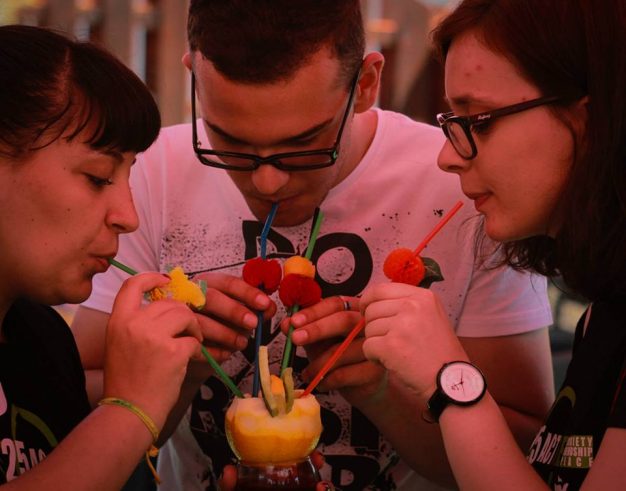
How to organize activities for young people in alcohol-free environments – 5 easy steps
Many civil society organisations are working with providing opportunities for young people to experience non-formal education, gain leadership skills, learn a new trait or simply have a quality free time. The importance of having a good quality activity for young people lies not only in the content of the activity, but also in the environment it takes place.
Alcohol-free environment
For this reason, an essential element in planning a good quality activity is to ensure an alcohol-free environment. Many children and young people live in families where one or both of the parents are experiencing alcohol-related problems. For these children and young people, attending events organised by civil society can sometimes be the only safe haven, the only escape from the often-harsh realities of their lives at home.
Evening activities that include drinking – parties infused with alcoholic beverages – can be a bitter reflection of everyday family life for the 9 million children and young people in Europe who live with one or both of their parents addicted to alcohol.
Frequently, when confronted with the question of staging activities in alcohol-free environments, the youth organisations we consulted reflected on the fact that alcohol is deemed a necessary component of having fun, relaxing in the evening or, for migrant young people, getting to know the culture.
Alcohol-free youth event – five steps
To organise an alcohol-free youth event – creating an environment that is safe and inclusive for everyone – there are five easy steps to follow:
1) Alcohol-free cocktails
If you believe that there is nothing better than having a tasty drink to end the working day – then say hello to alcohol-free cocktails. It is quite easy to find recipes online and it can be a good team-building exercise to make them together, or perhaps to create new ones. If the budget allows, a cocktail waiter can be brought in to prepare the drinks.
2) Indoor activities
Sometimes the best activities come from the group and, in order to keep up team spirit, especially after the official programme is over, a good idea is to organise some indoor activities:
– Theme party: you can announce it in advance, so the participants are prepared with their costumes and accessories. It is especially useful if the event is close to Halloween, New Years Eve or any other festive occasion.
– A number of small group activities: for example, Twister in one corner, Guitar Hero in the other, building a human pyramid on the third, learning Latin dances in the fourth. You can assign small teams that will be challenged to pass through all the activities in the fastest way and with the best quality.
– International evenings, with a twist: extremely useful when having an international group. You can ask the countries to prepare a presentation – but twist it by asking them to prepare for representing another country. So, for example, the Hungarians can present Iceland, the Serbians can talk about Norway and the Turkish about Ireland.
3) Outdoor activities
Explore the beautiful outdoors of the city you are in, by creating group activities that will both strengthen the team and give a good sightseeing opportunity.
– City challenge: you form teams from all the participants and then prepare a set of questions connected to the biggest landmarks of the city (for example, if you are in Stockholm, you can ask “How many guards are there in front of the Royal Palace?”). Each group has to photograph themselves to show that they have visited the place included in the question. The winning group is the one that comes back with all/most questions answered in the shortest time.
– Adventure house: every city has a house designed for team-building activities, or just having fun. Normally these houses have a set of different rooms that offer different challenges and tasks to be solved by the team in a given time. This experience is a real energy booster and enables the participants to get to know each other.
– A walk through the city, with or without a twist: depending on how much time you have in the agenda for exploring the city, you can either go for a classic walk through the city, or book a special tour. For example, if you are in Brussels, book a ‘lobby tour’ that speaks about EU policy, or a ‘chocolate tour’ that explores the city’s famous chocolate-making tradition.
4) Branding activities for your organisation(s)
If your organisation(s) are in need of a new T-shirt, slogan, drink or a signature campaign, you can also use the time to organise creative brainstorming sessions and come up with interesting proposals to help your work.
5) Other type of activities
Booking special events can be a good option if the budget allows: organising a road trip, a live band or a nice group dinner, are always popular ideas!
Author: Vasilka Lalevska




